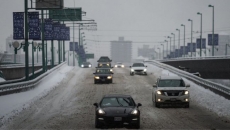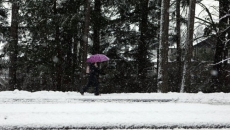Unhoused people have a fundamental right to live in encampments, and that right is violated when authorities tear them down, Canada's housing advocate says.
In a piercing report released Tuesday, Marie-Josée Houle says the expansion of homeless encampments across the country is a national human rights crisis that requires immediate action and co-ordination involving all levels of government. Tent encampments, the report says, are the result of Canada's "persistent failure" to protect people's right to housing, which the federal government officially recognized in 2019.
Governments must ensure that homeless people have permanent housing as soon as possible, and in the meantime, authorities need to equip encampments with basic services, such as clean water and garbage removal, so residents can live in dignity, the report says.
"For people living in these encampments, every day is a matter of life and death … At the same time, encampments represent an effort by people who are unhoused to claim their human rights and meet their most basic needs," the document says. "Canada has the capacity to solve this crisis. What is lacking is sufficient political will, resources and coordination."
In an interview ahead of the report's release, Houle called for an immediate end to forced evictions of homeless encampments, offering a blunt message to cities, including Halifax and Edmonton, that are trying to dismantle them: "These are human rights violations. This approach will only endanger lives."
Houle was appointed to monitor Canada's progress upholding housing as a human right. Her report, called "Upholding dignity and human rights," caps off a review that began in February 2023, and involved meetings with advocates, Indigenous leaders and people living in encampments across the country.
Since then, the issue has only become more urgent, she said.
In Halifax last week, the municipality issued eviction notices to people living in five of its 11 designated encampments, telling people they had to leave by Feb. 26. Last month in Edmonton, police tore down a camp deemed by the city to be "high risk," and arrested three people, including a journalist.
Unhoused people in Alberta, Saskatchewan, Nova Scotia and New Brunswick have died in camps, some from overdoses and tent fires. There are safety risks in tent cities, Houle said, but dismantling them pushes people further into the margins, where they're more vulnerable.
What's driving the growth of encampments across Canada, the report said, is a severe shortage of housing for low-income people, as well as inadequate funding of community services and mental health supports.
In the absence of affordable, accessible housing, people have the right to gather and live in encampments, the report said. Homeless encampments can provide community and security — qualities unhoused people often say are lacking in emergency shelters and other temporary housing options, it said.
Nobody living in camps should be forced to use shelters or other options that don't meet their needs, Houle said. "A lot of people experiencing homelessness have very bad trauma related to social services, related to institutions, related to people in uniform," she said.
"If there is going to be building trust for people to use resources, then forcing people and criminalizing them is never going to make that work."
Houle's report asks the federal government to establish a national encampments response plan by Aug. 31 that would fulfil her calls to action.
Cities should provide encampments with electricity, bathrooms, clean water, heat and other basic amenities, the review said.
Provinces and territories must offer health care, including harm reduction and mental-health services, as well as access to a safe supply of drugs for those who use them, it said. They must also increase welfare or income support, as well as minimum wages, and adopt legislation recognizing housing as a human right.
The federal government should work with the Canadian Mortgage and Housing Corporation to make federal funding for cities and provinces tied to a commitment to upholding the human right to housing, according to Houle's report.
Above all, Houle said, governments should take decisions about unhoused people after speaking with them and finding out what they need.
"It is a question of life and death for a lot of people," she said.
Ontario lawyer Shannon Down, who runs Waterloo Region Community Legal Services, said Houle's report will help arm lawyers trying to block evictions of homeless camps. Down was part of a successful fight against the Region of Waterloo's efforts to empty a tent encampment in downtown Kitchener, arguing that an eviction would violate residents' Charter rights.
"It's a step in the right direction, I think it's a powerful statement," Down said in an interview about the report. "I think it'll be a helpful advocacy tool."
However, she said the number of encampment evictions happening across the country far outweighs the number of lawyers and legal clinics willing to fight them.
Houle's report says homeless people should have more access to the justice system, and includes a call for provinces to beef up legal aid funding that support work like Down's.






